Bloody Mars
General situation
January 8 - April 20 of the year 1942 was carried out by the Rzhev-Vyazma operation - an offensive by the forces of the Kalinin Front under the command of Colonel-General I. S. Konev and the Western Fronts under the command of Army General GK Zhukov, conducted with the assistance of the North-Western and Bryansk Fronts . It was a continuation of the strategic battle for Moscow. Soviet troops threw the enemy to the west on 80 - 250 km, completed the liberation of the Moscow and Tula regions, liberated many areas of the Kalinin and Smolensk regions. The result of the operation was the formation of the Rzhev-Vyazma ledge.
The Rzhev-Vyazemsky ledge had up to 160 km in depth and to 200 km along the front (at the base). The German command considered this ledge as a strategic springboard for an attack on Moscow. Here was the shortest direction to Moscow - from the front line to Moscow in a straight line about 150 km. In the winter of 1942 - 1943 of the year, around 2⁄3 troops of the Army Group Center were concentrated in this area. It is clear that the Soviet command was trying with all its might to destroy the edge, aimed at the capital of the USSR. The main forces of the Kalinin and Western fronts acted against the bridgehead. The Soviet command carried out successively several operations with the aim of eliminating it, which would crush and throw away the troops of the Army Group "Center" further from Moscow.
July 30 - October 1 1942, the first Rzhev-Sychevskaya operation took place (or the second battle for Rzhev). Our troops attacked with the aim of defeating the German 9 Army under the command of General V. Model, defending on the Rzhev-Vyazma ledge, and eliminating the enemy bridgehead. In the course of the operation, Soviet troops advanced to the west by 40 - 45 kilometers, but they did not reach their goals.
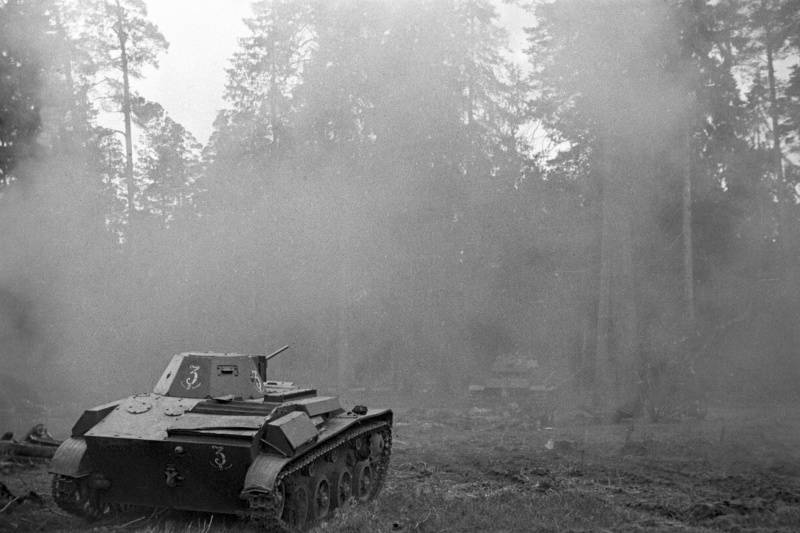
Soviet Tanks T-60 and KV-1 are fighting in the region of Rzhev
It is worth noting that by heat, rage and losses in the Rzhev direction, eyewitnesses on both sides were compared with the battles in Stalingrad. According to the memoirs of the Soviet military correspondent I. G. Ehrenburg: “I did not manage to visit Stalingrad ... But I will not forget Rzhev. Maybe there were offensives that cost more human lives, but there seemed to be no other, so sad - for weeks there were battles for five or six broken trees, for the wall of a broken house and a tiny knoll ... ”.
German military journalist J. Schuddekopf in October 1942 of the year in the article “Zazov Rzhev” wrote: “The German offensive in the East reached the Volga in two places: near the walls of Stalingrad and Rzhev ... What is happening on the smaller scale at Rzhev is almost year. Almost a day a day a year ago, the German troops reached the Volga for the first time ... Since then, three major battles have turned over a piece of land in the upper Volga — and the fourth, the most fierce, has been going on for more than two months. ”
The fighting near Rzhev became one of the bloodiest episodes of the Great Patriotic War. According to a study by historian A. V. Isaev, conducted on the basis of the archives of the Ministry of Defense, the losses in operations on an arc encircling Rzhev, 200 length - 250 kilometers, from January 1942 to March 1943, were: irrevocable - 392 554 people; sanitary - 768 233 person.
Party plans
The plan of the Soviet operation "Mars" appeared at the end of September 1942, as a continuation of the First Rzhev-Sychevskaya operation. October 10 Soviet troops received a directive to continue the Rzhev-Sychevka operation, which was again to be carried out by the forces of the Kalinin and Western fronts with the aim of: encircling and destroying the 9 of the German army in the area of the Rzhevsky protrusion. The beginning of the offensive was scheduled for October 23. Then the dates were shifted by a month. The general management of the operation was carried out by Army General G. K. Zhukov.
Of the eleven armies of the Western Front, under the command of General Konev, the 20, 31, and 29 were to take part in the offensive. The main blow was struck by the 20 Army under the command of Major-General N. I. Kiryukhin, consisting of six rifle divisions and four tank brigades. After breaking through the enemy defenses in its lane, it was planned to introduce into the battle a mobile group under the general command of Major General V. V. Kryukov as part of the 6 tank and 2 guards cavalry corps and the 1 scooter and motorcycle brigade.
From the Kalinin Front, Colonel-General M. A. Purkayev, the 3 armies were also distinguished. The 41 Army under the command of Major-General F. G. Tarasov and the 22 Army of Major-General V. A. Yushkevich delivered a blow to the east, against parts of the Western Front, and the 39-I army of Major-General A. I. Zygin should have been advancing south, in the direction of Olenino. In the strip of the 41 Army for the development of success it was planned to introduce into the battle 1 of the mechanized corps of General M. D. Solomatin. The Solomatin corps numbered more than 15 thousand soldiers and 224 tank, of which 10 KV, 119 T-34 and 95 T-70. In addition, the 41-I and 47-I tank brigades (another hundred tanks) were in reserve of the 48 Army. In the zone of the 22 Army, in addition to the 185 Division, the 238 Division Infantry Division, the 3 Mechanic Corps under the command of Major General M.Ye. Katukov - three mechanized and one tank brigade, 13,5 thousand people, 175 tanks. In reserve, the commander had a 114-I infantry brigade and 39-th tank regiment.
Thus, the German army was going to defeat by several simultaneous breakthroughs on those sectors of the front where no major attacks had been carried out before: between the Osuga and Gzhat rivers - by the 20 army, in the Young Tuda region - by the 39 army, in the valley of the river Luchesa - by the forces of the 22 army, south of the city of Bely - by the forces of the 41 army. In the last three areas, the density of the German defense was 20 - 40 km per infantry division, which was supposed to facilitate its breakthrough. At the site of the 20 Army, the defense was much denser — the 2 division (including the 1 tank division) at the front in 15 km. In case of success of the first stage, the 5-i and 33-i army (they were opposed by the 3-I German tank army) were to be connected in the direction of Gzhatsk, Vyazma. Subsequently, after the failure of the first stage, the Bid with a directive from 8 December 1942 gave a new indication: after regrouping the troops of the Kalininsky and Western fronts, by the end of January, crush the enemy grouping and reach our old defensive line. That is, it was supposed to reach the line on which in September 1943, in the rear of the Western Front, stood the armies of the Reserve Front.
At the same time, another operation was being prepared on the right wing of the Kalinin Front — the attack of the 3 shock army of Major General KN Galitsky on Velikie Luki and Nevel in order to cut the Leningrad-Vitebsk railway in the Novosokolniki area. In the future, the Soviet command calculated, having liquidated the Great Bridge of the enemy, to open the way to the Baltic States. The 2 th mechanized corps under the command of General I. P. Korchagin was in the reserve of the army. The main blow south of Velikie Luk, bypassing the city from the northwest, was struck by the 5 th rifle corps of Major General A. P. Beloborodov. In the breakthrough zone of the main forces of the 5 Infantry Corps, the 2 Mechanic Corps was introduced. Towards Beloborodov from the region north of Velikiy Luki, the 381-Infantry Division of Colonel B.S. Maslov was advancing. From the front, the city covered the 257 Rifle Division of Colonel A. A. Dyakonov. To the south of the guardsmen of Beloborodov, the 21-I Guards and 28-rifle divisions of the 3-th shock army and the right-flank 360-th division of the 4-th army attacked.
The Germans did not have enough troops here, so they concentrated their efforts on protecting the most important sectors. The Great Bow District was defended by units of the 83 Infantry Division and one guard battalion. However, the city itself was turned into a powerful, prepared for a circular defense center of resistance, saturated with fire weapons. Many buildings turned into long-term firing points, interacting with each other and blocking streets and intersections with fire. The front edge of the defense was 5 km from the city outskirts. To the south, in the Martyanovo area, the site was covered by two separate battalions. Between these two garrisons and north of the Great Onions, there were only small garrisons in separate settlements.
The 3-I Mountain Division and the 55 th regiment of 6-barreled mortars were located in the area of Novosokolnikov. The Germans also pulled up reserves: the 20-i motodivision was concentrated north-east of Nevel; the 291-I infantry division was pulled up to the area of Tumor against the southern flank of General Galitsky; northeast of the Great Bows, the 8-I tank division was deployed from the Kholm region. The headquarters of the 59 Army Corps, which arrived at Novosokolniki from Vitebsk, was supposed to unite all these units. Later, with the purpose of releasing the surrounded garrison of the Great Onions, other German formations also entered the battle.
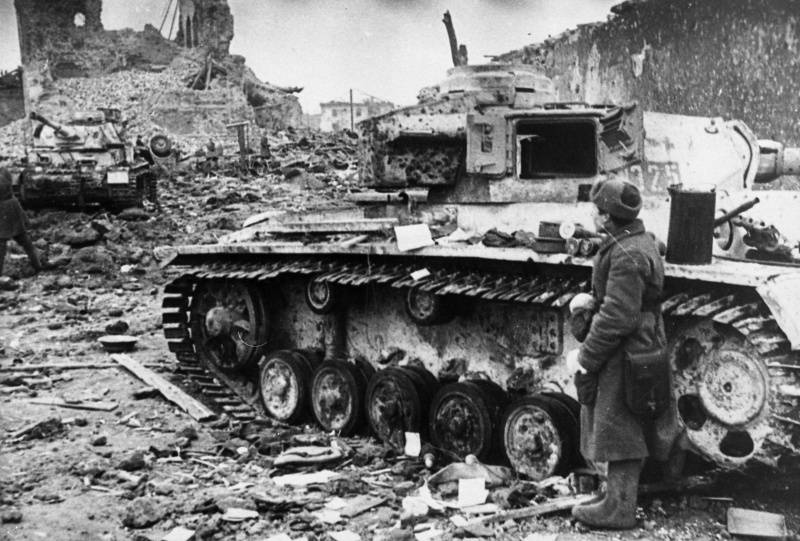
Soviet soldiers inspect German tanks abandoned in the Great Bow area
The forces of the parties
In the Moscow strategic direction, the main grouping of Soviet troops was still concentrated in the area from Holm to Bolkhov. In sum, the forces of the two fronts and the Moscow defense zone with reserves The stakes consisted of 1890 thousand people, more than 24 thousand guns and mortars, 3375 tanks and 1100 aircraft. They were confronted by almost all troops of Army Group Center (except for five divisions on its extreme right flank), and 2 divisions of Army Group North — the entire 72 division (except for 9 security and field training in the rear), of which 10 tank and 6 motorized. Army Group "Center" along with the reserves had about 1680 thousand people, up to 3500 tanks.
A total of 545 thousand people and 1200 tanks were allocated for operations "Mars". Two Soviet fronts engaged seven of the seventeen armies in the offensive: 41, 22, 39, 30, 31, 20, and 29. At the second stage (in early December), the 5 and 33 armies were to join the offensive. The intended offensive of these two armies did not take place only because of the failure of the first stage of the operation.
Colonel-General V. Model's 9 Army, which took the brunt of the Soviet troops, consisted of: 6 Army Corps (2 Airfield, 7 Airborne and 197 Infantry Divisions); 41 Tank Corps (330-I and 205-I Infantry Divisions, regiment 328-th Infantry Division); The 23 Army Corps (246, 86, 110, 253, and 206 Infantry Divisions, 87 Infantry Division and 10 Motorized Division); The 27 Army Corps (95, 72, 256, 129, 6, and 251 Infantry Divisions, two regiments of 87 Infantry Division); 39 Tank Corps (337-I, 102-I and 78-I infantry, 5-I tank division). The 9 Army Headquarters subordinated to two motorized divisions (14 and Great Germany), 1 and 9-tank divisions, 11-tank division of battalions (37 tanks) and 1-cavalry division. In addition, reserves of Army Group Center — 12, 19, and 20 — tank divisions were located at the base of the projection, which in a critical situation could be quickly transferred to a dangerous direction.
Directly on the Rzhev-Vyazma ledge in front of the front of the 20 and 31 of the Soviet armies, the 39 tank corps was defensive. Behind him were reserves — the 9-I tank and 95-I infantry divisions. The German 22 tank corps was located on the western flank of the protruding 41 and 41 armies, behind which were also military reserves - the 1 tank division and the Great Germany SS moto-division. To the north, the 23 Army Corps occupied the defense.
The German command took into account the mistakes of the previous campaign and prepared for winter (during the 1941 campaign of the year, Hitler planned to win before the onset of winter, so the troops were not ready with the harsh Russian winter). All personnel were provided with warm uniforms. German defense was continuously improved in engineering. Minefields were set up in all directions of the enemy's probable strikes, powerful strongholds were created, a system of wooden-earth firing points, etc.
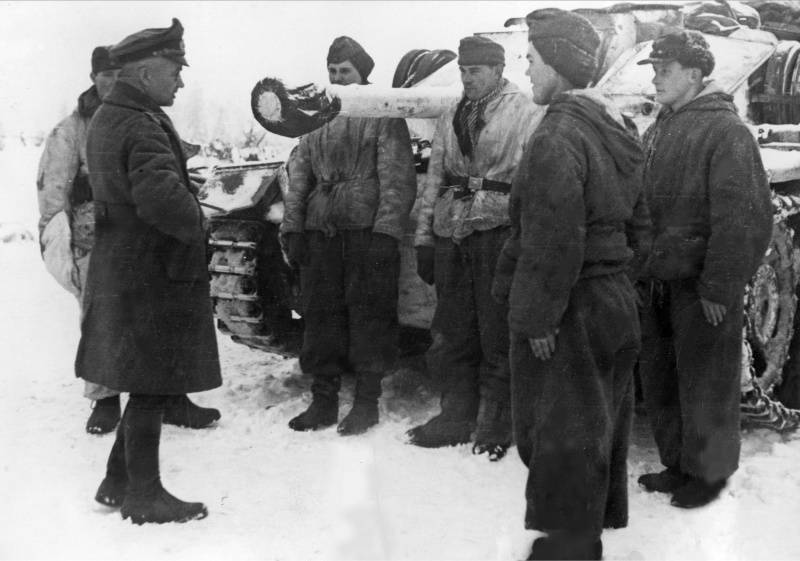
Colonel-General Walter Model speaks to the crew of an assault gun StuG III
Beginning of the offensive
The operations of the troops of the Western and Kalinin fronts began on November 25 in three directions at once. Two armies of the Western Front attacked the eastern front of the Rzhevsky bulge north of Zubtsov, on the 40-kilometer stretch along the Vazuz and Osuga rivers. At the same time, the 22-I and 41-I armies of the Kalinin Front struck a counter blow from the western flank of the ledge.
The 3 Shock Army launched an offensive against the north wing of the Army Group Center, trying on both sides to embrace Great Luke. November 24 in 11 hours after 30-minute artillery preparation, the advanced regiments of three divisions of the 5 Guards Rifle Corps launched an attack. Having advanced deep into 2-3 km, by the end of the day our troops reached the main enemy defense zone. In 9 hour. 30 min. November 25 began an hour and a half artillery preparation, after which the main forces of the army launched an offensive. During the day of the fighting, the army of Galitsky advanced to a depth from 2 to 12 km, with the 381 Infantry Division advancing from the north achieving the greatest success. Over the next two days, army troops with stubborn battles, beating off fierce counterattacks of the enemy, slowly moved forward.
By the end of November 27, Army intelligence found that the enemy was pulling up reserves in the battle area: the 8-th tank division from the north, the 291-th infantry and the 20-th motorized from the south. The command of the 3 shock army strengthened the flanks of the advancing group, which allowed it to counter enemy attacks. In the evening of November 28, near the Ostrian station, the 381-th and 9-th Guards Divisions met, closing the ring around the German garrison of the Great Onions. In addition, part of the forces of the German 83 Infantry Division was surrounded south-west of the city, in the area of Shiripino settlement. The offensive of the Soviet troops in order to seize the Novosokolniki met with strong enemy defenses. The 18-I and 34-I mechanized brigades and the 381-I infantry division could not overcome the resistance of the 3-I mountain enemy division and capture the city. However, by the end of 3 December, the enemy group was completely destroyed, surrounded by Shiripino. After that, the troops of the 3 shock army went over to the defensive, reflecting attempts by the German forces to break through to the Great Onions.
On Rzhevskiy ledge offensive developed worse. The night before the onset, the weather in the 20 and 31 armies changed dramatically, snow fell, a snowstorm began. The gunners fired on the squares, which sharply reduced the effectiveness of the artillery preparation, and although it lasted an hour and a half, its results were insignificant. When the Soviet infantry went on the attack, the enemy’s non-suppressed gun emplacements had a strong opposition. The 31 Army Major General V. S. Polenov failed to break through the enemy defenses. Her rifle divisions, supported by 332 and 145, by tank brigades, at the cost of great losses, achieved only insignificant successes. South of the 20-I army Kiryukhin reached a little more - 247-I Infantry Division, with the support of 80-th and 140-th tank brigades, forced the river. Vazuzu and captured a bridgehead on its western shore. The commander immediately threw into battle his reserve — the 331 th rifle division of colonel P. Ye. Berestov. Under heavy enemy fire, units of the 20 Army were slowly making their way forward, expanding the bridgehead. However, here it was not possible to break through the German defense.
Then Zhukov and Konev decided to throw forward the reserves and the mobile group, without waiting for the infantry to crack the enemy defenses. At the dawn of November 26, units of the second echelon - the 8th Guards Rifle, 6th Tank and 2th Guards Cavalry Corps began their advance to the bridgehead. However, a quick massive blow did not work. Two hundred tanks, thousands of riflemen and cavalrymen in long columns stretched along two narrow, snow-covered roads leading through the river to the west bank. As a result, the mobile units suffered losses from German artillery fire, not yet entering the battle. Only in the middle of the day the 6th Panzer Corps, which, due to General Getman’s disease, was commanded by Colonel P.M. Arman, crossed over to the bridgehead. Cavalry divisions were forced to linger on the east bank of the river until the next day.
Tankers rushed forward and achieved some success, freed several settlements. However, the success was bought at a high price: the brigades lost up to half of the personnel and tanks, there were many wounded requiring evacuation, and it was necessary to replenish stocks of fuel and ammunition. The tank corps went on the defensive. At this time, the German command was transferring part of the 27 Army Corps from the Rzhev area and the 9 Tank Division from the Sychevka area to the breakout area.
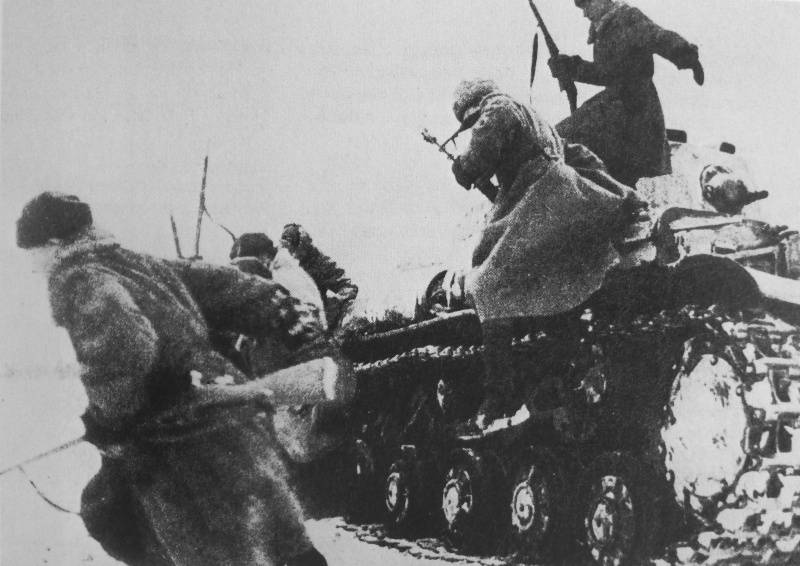
Soviet tank landing dismounts from the KV-1 tank on the Kalininsky front
The Kalinin Front attacked at once with both its wings and achieved more noticeable successes. The 41 Army under the command of G. F. Tarasov, aimed at the left flank of the Rzhev group, launched an offensive against the city of Bely, northward along the river Luches, was struck by V. Yushkevich’s 22 Army. In the morning of November 25, the 41 th Army Strike Group - the 6 th Siberian Voluntary Rifle Corps of General S.I. Povetkin and the 1 th Mechanized Corps, despite the blizzard and unsuitable terrain for attack, broke through the enemy defenses and began to bypass Bely, trying to cut the highway on Dukhovshchina. By the evening of November 27, advanced units of the 65 and 219 of the tank crews of the Solomatin mechkorpus reached Bely - Vladimirskoye road, interrupting one of the two most important communications of the German 41 tank corps.
Thus, a breakthrough 20 km wide and 30 km deep formed in the German defense. However, the Soviet infantry and artillery in off-road conditions were far behind the tankers, weakening the strike power of mobile units, which allowed the enemy to transfer reserves to dangerous areas. The mistakes of the Soviet command played a major role in this: the command and interaction of the troops were unsatisfactory, and there was no reliable connection with the units.
In addition, instead of following the tanks and completing a deep reach, General Tarasov threw the 150 Infantry Division north to the storming of Bely. However, our troops could not break the resistance of the enemy's 146 Infantry Division. In the morning of November 26, the German reserves approached - the 113-th motorized regiment of the 1-th tank division and the fusilier regiment of the Great Germany SS moto-division. The rest of the 1 Tank Division was thrown to the north - against two Solomatin tank brigades that mounted the Bely-Vladimirskoye highway. November 27 Tarasov threw in reserve - 47 and 48 tank brigades. However, Tarasov didn’t even send them into a breakthrough - the commander conceived a new roundabout maneuver. The 47 Brigade of Colonel I.F. Dremov was sent northeast of Bely to try to close the encirclement around the city. On November 29, Dremov managed to bypass the city and get on the Bely-Vladimirskoye highway, but he could not go further.
North of the 22-I army on the first day of the attack Yushkevich broke through the German defenses at the junction of the 86-th Infantry Division of the 41-Tank Corps and 110-th Infantry Division of the 23-Army Corps. The Germans did not have a solid defense here, the main obstacle for the advancing Soviet troops was at first deep snow and numerous minefields. On the next 2 of the day, General Yushkevich brought the Katukov Mechanized Corps into battle. Enemy troops dislodged from the valley of the river Luchesy. Further, the offensive stalled, as the Model transferred the last regiment from the Great Germany division to the 23-th Army Corps strip. The command of the Soviet army threw into battle its last reserves — the 114 th infantry brigade and the 39 th tank regiment. However, this did not help, the Soviet units could not advance further and go onto the Olenino-Belyy highway.
From the north, the 23 Army of Zygin, which had three rifle divisions, four rifle divisions and two tank brigades, advanced on the position of the German 39 Army Corps of the Germans. Since the army delivered an auxiliary strike, it had no reserves. As a result, it was impossible to break through the enemy defenses and enter the Olenino-Rzhev 39 highway. Its parts advanced only a few kilometers, and then were thrown back to their original positions.
To be continued ...
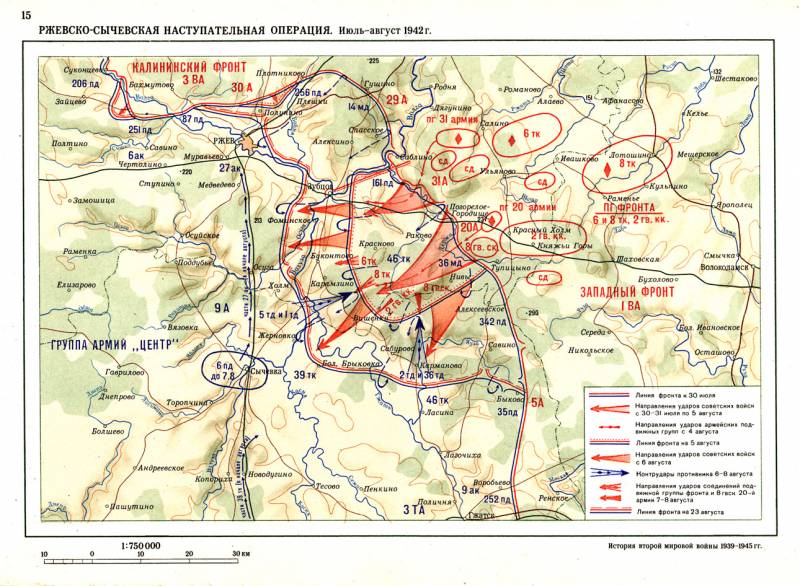
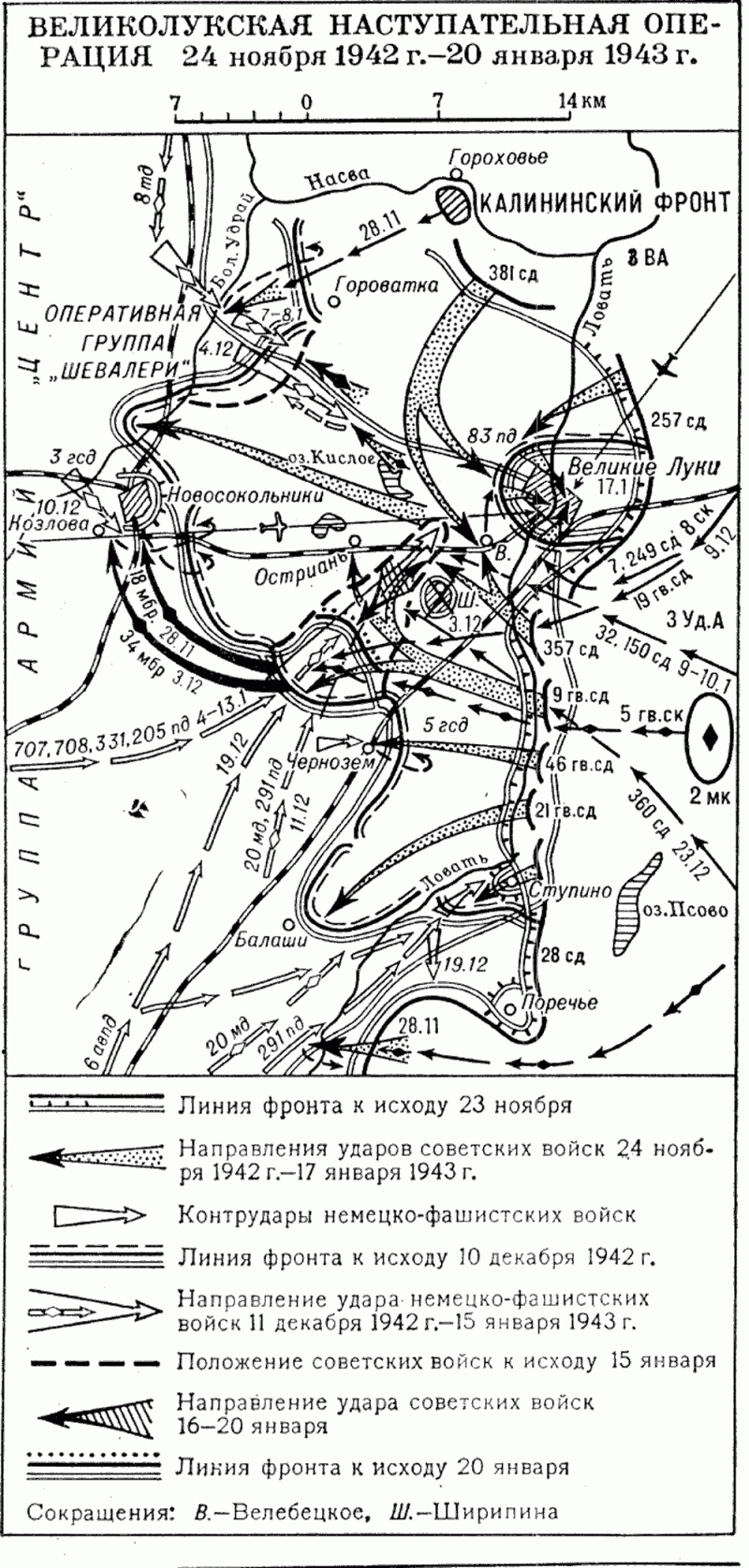
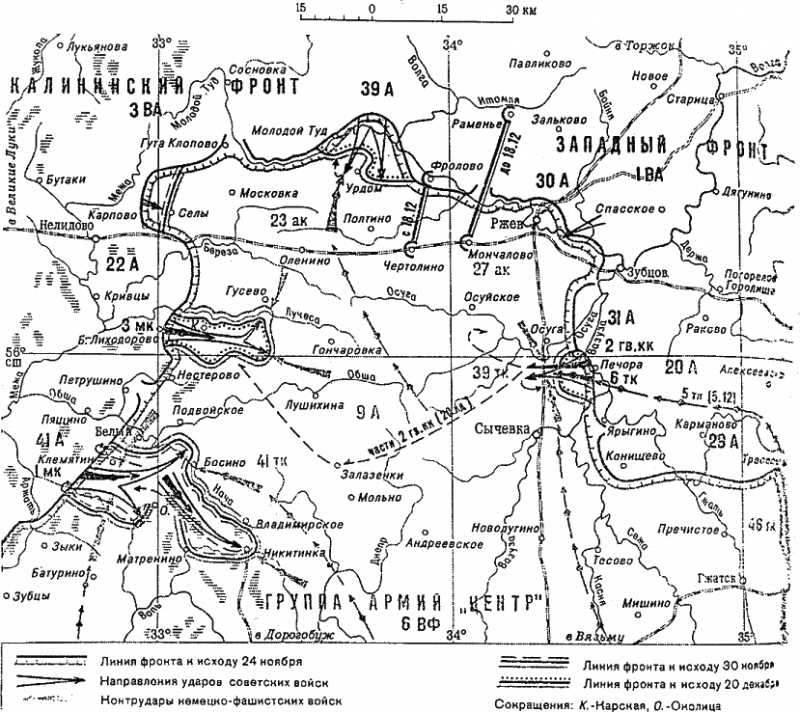
Information